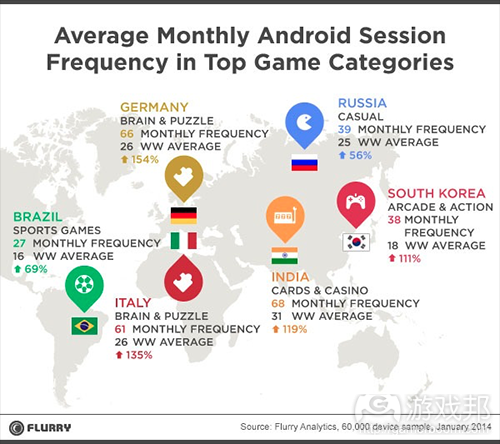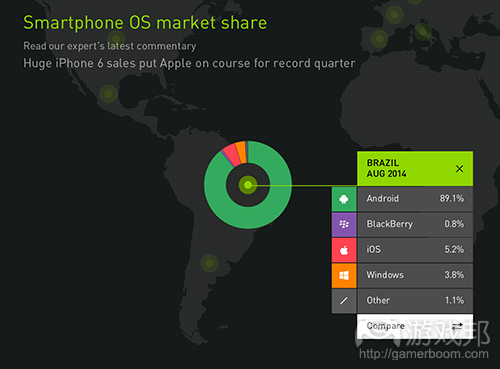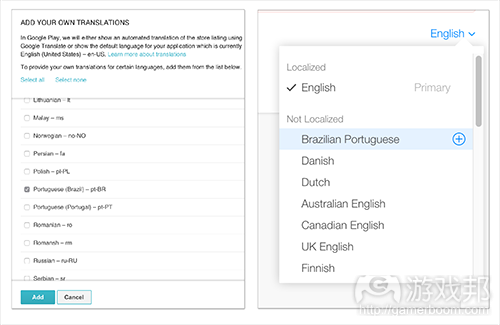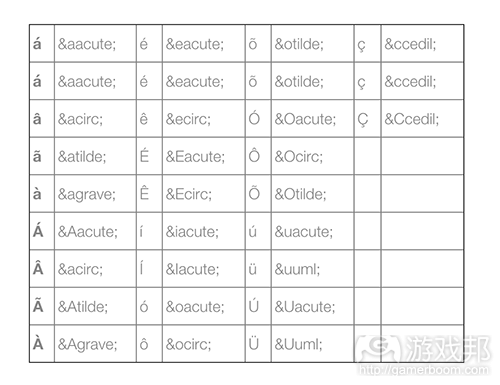针对开发者进军巴西游戏市场的建议
作者:Patrick Yip
游戏开发者为何需重视巴西市场?
这个市场很庞大并且发展迅速
巴西游戏行业去年收益为14亿美元,成为拉美地区第一大游戏市场,在世界游戏市场排名第五。手机游戏在该地区也相当受欢迎,在其数字游戏市场中占据最大份额。预计2015年,该地区游戏总收益将达24亿美元,同比增长71%。巴西有53%网民体验数字游戏。
游戏本土化是盈利的关键
2012年《使命召唤:黑色行动II》开发商将这款转换成巴西葡萄牙语版本,推动其销量比上一年增长300%。据巴西游戏分销商LUG主管Julio Vieitez所称,“对比优秀游戏的葡萄牙语和英语版本,你会发现前者收益比后者高15倍。”
巴西人偏爱葡萄牙语版游戏
本土化游戏在巴西取得成功并不令人意外。英语在巴西的普及率还很低——据最近的EF English First Proficiency指数显示,该地区英语普及率在63个国家中排名第38位。而世界上的游戏玩家也大多偏爱本土语言的游戏。即使有巴西人说英语,他们的朋友也未必就会说英语。Vietitez称“因为人们喜欢同朋友玩游戏,所以本土化真的很重要。”
针对巴西市场的本土化操作发展缓慢,开发者应抢先抓住这一时机。
截止2014年12月4日,巴西iOS App Store排名前三的游戏中,仍然有两者尚未转换成巴西葡萄牙语版本。例如《Sniper 3D Assassin》作为巴西最受欢迎的游戏之一,只推出日语和法语版本,却没有巴西葡萄牙语版本。对于多数游戏开发者来说,该国属于未开发或开发尚不充分的市场。所以要快些采取行动,未来将有更多游戏开发者瞄准这个不断繁荣发展的市场。
在巴西表现良好的游戏类型
关键词:足球
总体上看,巴西文化与美洲(包括美国在内)其他地区较为相似。与面向中国或日本的本土化操作不同的是,开发者进军巴西市场并不需要过于担心文化适应性的问题。但是,明智的开发者需要注意的一个区别就是:巴西人的足球文化。足球是该国的名片。各体育运动,尤其是与足球有关的类型,是巴西智能手机用户最青睐的游戏类型。
巴西是Android主导的市场
需要注意的是巴西政府对电子设备征收重税,例如在美国零售价为499美元的iPad Air,在巴西就需要760美元。鉴于如此高昂的价格,巴西人倾向于选择价格更合理的设备,Android手机在此尤为盛行。据Kantar Worldpanel数据显示,截止2014年8月,Android在巴西智能手机操作系统市场中占比将近90%。
在线博彩仍是个灰色地带
巴西禁止赌博。但博彩类游戏开发商可以放心的是,这一条款并未覆盖在线博彩领域(至少现在还没有),因此博彩游戏仍是巴西最畅销的iOS游戏类型之一。
本土化操作需注意的细节
巴西葡萄牙语和欧洲葡萄牙语存在区别
这两者有何不同?
非常不同,发音不同,拼写不同,通常连文字都不相同。例如在巴西,洗手间的写法是banheiro,而欧洲葡萄牙语则是sala de banhos。
要推出巴西葡萄牙语版本而非“中立的”葡萄牙语版本
有些翻译人员或者翻译代理机构会建议你将游戏翻译成“中立”形式的葡萄牙语,以便节省费用。但我们强烈反对这种做法。“中立的葡萄牙语”并不存在,也并不能反应人们在现实生活中的体验。你必须聘请来自巴西的本地翻译人员执行操作。在向当地的iOS和Google Play商店提交应用时还要确保选择了正确的葡萄牙语格式。
(向应用商店提交巴西葡萄牙语版本,左图为Google Play,右图为iTunes App Store)
翻译成巴西葡萄牙语版本并非易事
注意语法性别
葡萄牙语采用了一种性别系统(男性和女性),这会影响名词、形容词和代词。在准备翻译文本时,你必须确保自己的字符串包装支持葡萄牙语法规则,或者进行性别中立的翻译。有名葡萄牙语翻译就指出,巴西葡萄牙语的默认性别是男性格式,同时适用于两种性别的用户。
翻译长度通常比英语多30%
翻译成巴西葡萄牙语之后的文本,通常会比英语版本长30%。要确保这种翻译不会破坏你的用户界面。要将你的文本展示设置为自动调整方式,并考虑执行设备上的测试。
注意巴西日期、时间和货币格式
除了文本之外,各国采用的数据和货币格式也不尽相同。在巴西,日期书写格式为*日/*月/*年,用户不习惯*月/*日/*年这种美式日期格式。从时间来看,巴西人用的是24小时表达方式,例如“21点15分”就不能写成“晚上9点15分”。
其货币格式的逗号和小数点用法也和美国不一样。例如1500.25雷亚尔(巴西货币单位)写书格式就是R$1.500,25。
不要硬码时间或货币格式
为了便于本土化操作,最好用文件形式而非特定的格式进行数据内部存储。要在你的编程语言中使用数据输入。
如果你允许用户输入,那就要将日、月和年分别收集在不同的域中,并通过这些域在内部创建一个日期数据输入。最后,当你呈现日期时,要用正确的系统设置对其进行规范。
巴西位于南半球,所以要注意该地区季节
巴西的圣诞节很热,而7月份的假期又很冷。要留心游戏中与这些季节及天气有关的内容,确保最终的本土化产品对应的是南半球的情况。最好要让翻译人员也留心与气候相关的内容。
注意特殊字符
巴西葡萄牙语中有许多特殊字符,包括甚为罕见的“õ.”。要确保进行本土化操作之前,你的游戏数据和代码能够处理这些字符。
不要添加过多特定城市的元素
转化成巴西版本的游戏通常会用到里约热内卢的俚语和用辞,而许多不在该城市的巴西玩家却会抱怨这种现象。毕竟不同地区的俚语和方言也会有所区别。最好让翻译人员选择适用于整个巴西国家而非单个城市的葡萄牙语。
总结
中国无疑是行业的焦点,但如果你想进入一个快速发展中的游戏市场,巴西也是个不错的选择。经过一些明智的游戏本土化处理,你就有可能在拉美最大的市场立足了。(本文由游戏邦编译,转载请注明来源,或咨询微信zhengjintiao)
The Essentials to Game Localization in Brazil
by Patrick Yip
Why does Brazil matter to game developers?
The market is big and growing fast.
Last year, Brazil’s gaming industry generated $1.4 billion in revenues making it the largest gaming market in Latin America, and the fifth largest in the world. Mobile games are especially popular and they take up the largest share of the digital games market with $606 million in revenues per year. And by 2015, estimated total revenue will be $2.4 billion dollars, a 71% increase. The numbers make sense as a full 53% of Brazil’s online population plays digital games.
Game localization in Brazil is essential for monetization
In 2012, the developers of “Call of Duty: Black Ops II” localized their game into Brazilian Portuguese. Consumers noticed: sales were 300% higher than previous years. And it’s not just Call of Duty. According to Julio Vieitez, director of the Brazilian game distributor LUG, “When comparing the revenues of a good game in Portuguese and in English, the former is 15 times higher than the latter.”
Brazilians prefers Portuguese
The success of localized games in Brazil shouldn’t be a surprise. English proficiency is Brazil is low—it’s ranked 38th out of 63 countries in the most recent EF English First Proficiency Index—and gamers around the world prefer to play in their native languages. And even if a Brazilian speaks English, her friends may not. “[Localization] is important because people want to play with their friends,” says Vietitez.
Localization in Brazil has been slow. Move quickly to get ahead.
As of December 4th, 2014, two of the top three games in Brazil’s iOS App Store had not yet been translated into Brazilian Portuguese. Sniper 3D Assassin, for example, has Japanese and French versions, but nothing localized to Brazil, even though it’s one of the country’s most popular games. For many game developers, the country is an untapped or under-tapped market. Move quickly: more and more developers will be preparing their games for Brazil’s booming digital game scene.
“When comparing the revenues of a good game in Portuguese and in English, the former is 15 times higher than the latter.” – Julio Vieitez, Director of LUG
Which games do well in Brazil?
One word: soccer
On the whole, Brazilian culture is similar to cultures in other parts of the Americas, including the United States. Unlike a localization campaign in China or Japan, there’s not much acculturation work required if you’re heading into the Brazilian market. However, smart developers should be prepared for one difference: Brazil’s total obsession with soccer. The game is central to the country’s identity, and sports games of all kinds—but especially those involving soccer—are the most popular game category among smartphone users in Brazil.
Game downloads in Brazil
Sports game is the most popular game category in Brazil (Source: Flurry)
Brazil is Android territory.
You should be aware that Brazil places a high tax on electronic devices. An iPad Air, for example, retails for US$499 in the United States, but costs a full US$760 in Brazil. As a result of these high prices, Brazilians gravitate to more affordable devices, and Android phones are especially popular. According to Kantar Worldpanel, as of August 2014 Android controlled almost 90% of the smartphone operating system market in Brazil.
Smartphone OS market share in Brazil (Source: Kantar WorldPanel)
Online gambling is still a gray area.
Gambling is banned in Brazil. But developers of casino games can take heart: regulations in Brazil don’t cover online gambling (at least not yet), therefore casino games are some of the top iOS sellers in Brazil.
Taking localization seriously
Brazilian Portuguese and European Portuguese are not the same.
But how different are they?
Very different. Different pronunciation, different spellings, and, often, totally different words. In Brazil, for example, a bathroom is a banheiro. In Portugal, it’s a sala de banhos. Want some more examples? Check out this blog post.
To localize your game to Brazil, translate it into Brazilian Portuguese, not “neutral” Portuguese
Some translators or translation agencies will propose that you translate your game into a “neutral” form of Portuguese, in order to save money. We strongly recommend against this. “Neutral Portuguese” doesn’t really exist, and it doesn’t reflect people’s real-world experiences. You need to hire native translators who are from Brazil. And make sure that you choose the right form of Portuguese when submitting your app description to the local iOS and Google Play store.
Submitting Brazilian Portuguese translations to App Stores (left: Google Play, right: iTunes App Store)
Translating into Brazilian Portuguese can be tricky
Be aware of grammatical genders
The Portuguese language utilizes a gender system (masculine and feminine), which will affect nouns, adjectives, and pronouns. When preparing text for translation, you need to make sure that your string wrapping supports Portuguese grammar rules. Alternatively, you can ask for a gender-neutral translation. Gabriel G., one of OneSky’s Portuguese translators, points out that the default gender in Brazilian Portuguese is the masculine form, which can be used when you’re trying to reach both genders.
Translations are usually 30% longer than English
After it’s been translated into Brazilian Portuguese, text tends to be 30% longer than it was in English. Make sure that the translation doesn’t break your user interface! Set your text display on autofit, and consider conducting on-device testing.
Brazilian date, time and currency formats are different
It’s not just words that need translation—numbers and currencies also differ from country to country. In Brazil, the date format is DD/MM/YYYY. Users will be tripped up by the American MM/DD/YYYY. In terms of time, Brazilians use a 24-hour clock. It’s “21:15h,” not “9:15p.m.”
When it comes to currency, the commas and decimal points are the opposite of the American system. One thousand and five hundred Brazilian reals and 25 centavos, for example, should be written as R$1.500,25.
Never hard-code time or currency
To make localization easier, store your number data internally and in files, without using a particular format. Instead, use the data type for your programming language.
If you allow user input, collect the day, month, and year in separate fields, and internally build a date data type from these fields. Finally, when you display dates, format them with the right system settings.
Brazil is (mostly) in the southern hemisphere, so the seasons are different.
Christmas in Brazil is hot. A school vacation in July can get pretty chilly. Keep an eye on references to the weather or the seasons in your game, and make sure that the final, localized product is southern hemisphere-appropriate. It helps to ask your translator to pay special attention to any climate-related content.
Beware of special characters
Special charactes of Brazilian Portuguese
There are a lot of special characters in Brazilian Portuguese, including the rare “õ.” Make sure that your game data and code can handle these characters before you get going on localization.
Avoid adding too much street style
Games localized to Brazil often end up using the slang and terminology of Rio de Janeiro, and a lot of Brazilian gamers outside of the city complain about the Rio vibe. After all, local slang varies widely from region to region. With a proper translation style guide, you can make sure that your translators give you a form of Brazilian Portuguese that’s localized to the whole country—not just one city.
Conclusion
China (deservedly) gets a lot of attention, but if you’re looking to enter a fast-growing gaming market, Brazil is also a great option. With some smart game localization, you’ll be ready to thrive in Latin America’s largest country.(source:oneskyapp)
上一篇:关于《模拟城市建造》中的进程控制











































 闽公网安备35020302001549号
闽公网安备35020302001549号